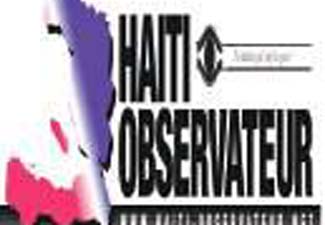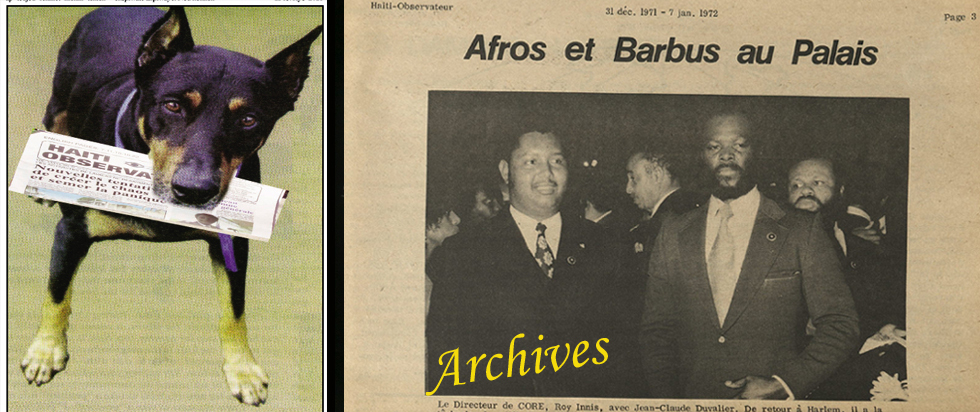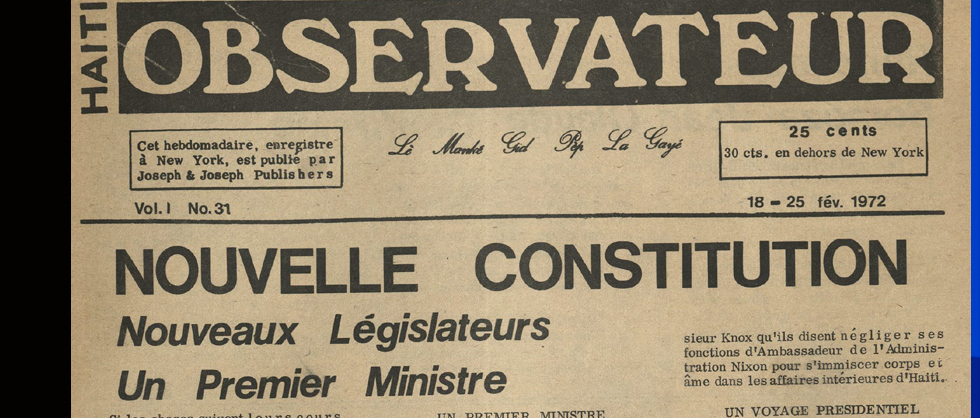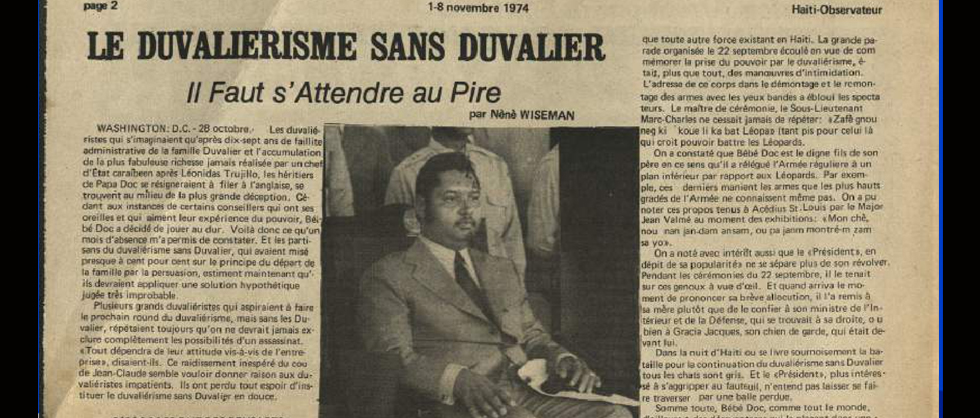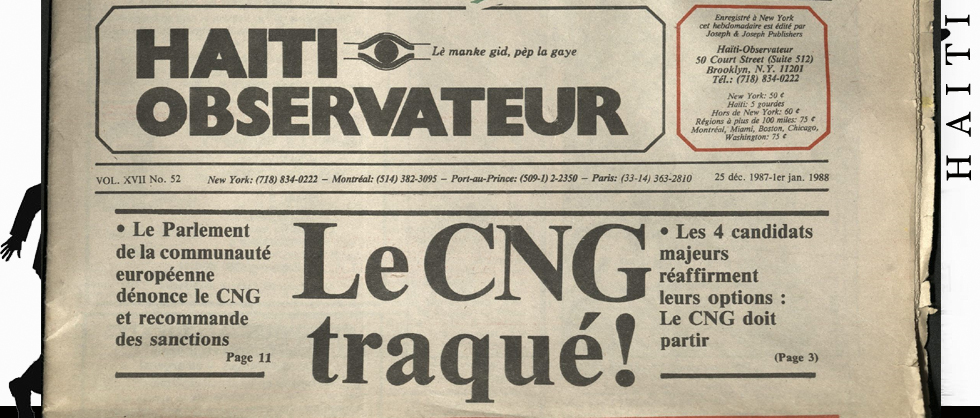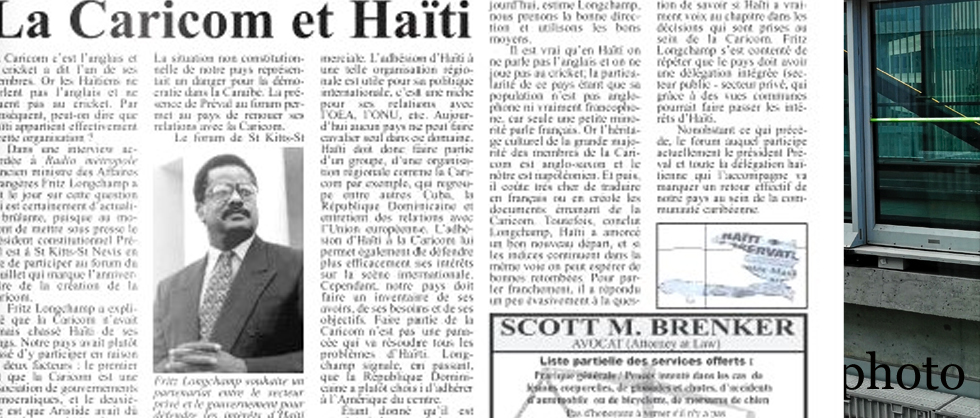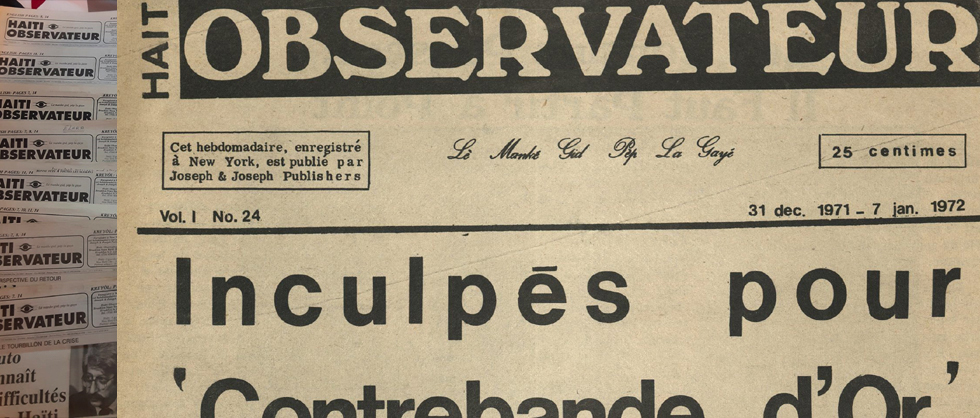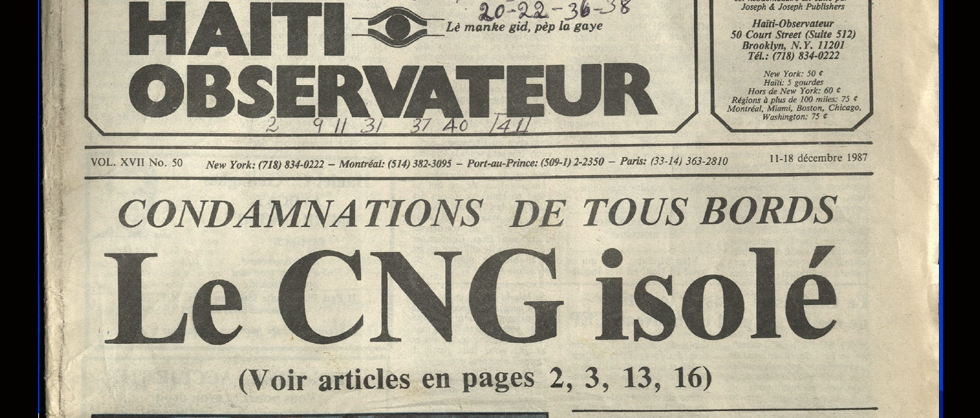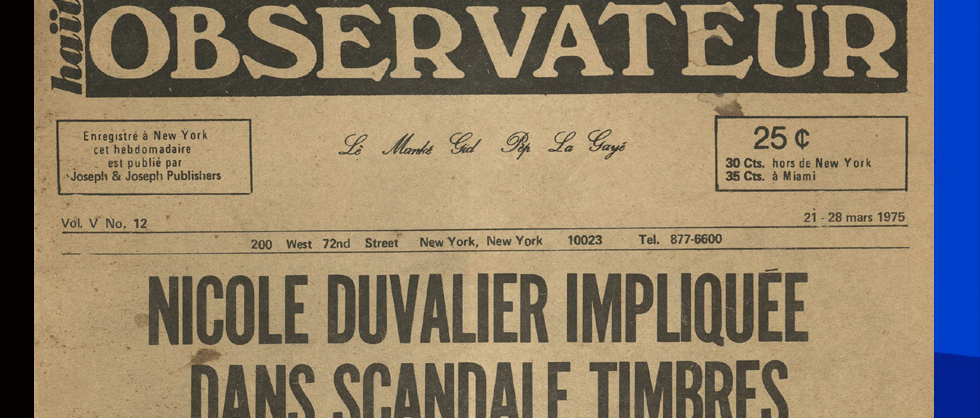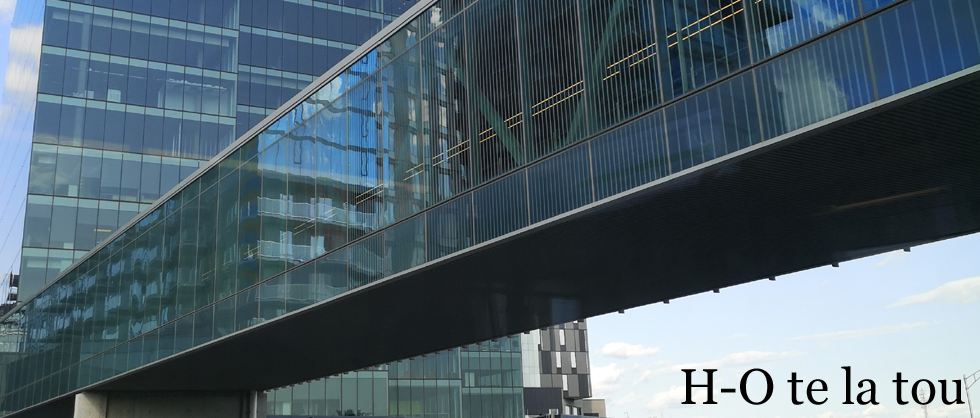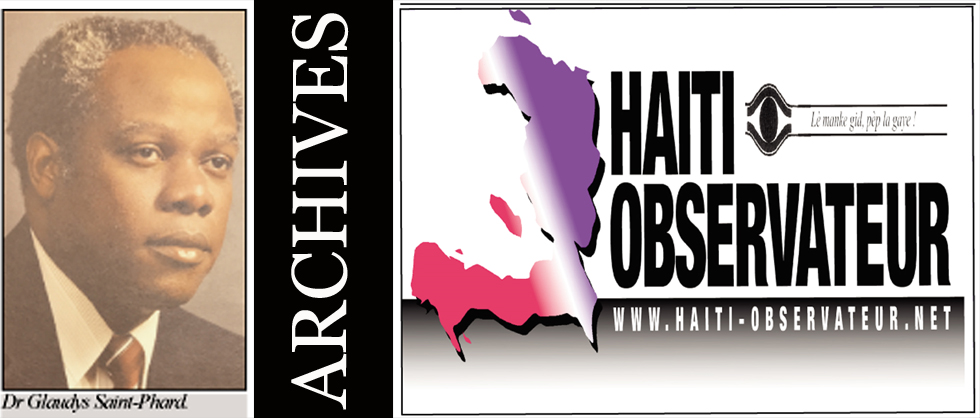HAPPENINGS !
- Heavily-armed foreigners arrested in Haiti as the country faces more turmoil
The arrest, last Sunday evening (Feb. 17) of eight heavily armed men in the capital of Port-au-Prince, by a patrol of the Haitian National Police (French acronym PNH) is turning into an international incident with major consequences. To be noted only seven names have been released and a photo taken at the Police precinct in downtown Port-au-Prince shows only seven men.
According to Police sources, most of the men were either U.S. citizens or legal residents holding green cards. Mention is made of one of Serbian nationality, a Russian and a Haitian. The Haitian citizen arrested with the group is Michael Estera, 38 years old. He had a Haitian driving licence with the address of 15 Laboule 12, in the hills beyond Pétion-Ville, formerly an upscale suburb.
One Danilo Bajagic, 36 years old, is of Serbian nationality, but a permanent U.S. resident since June 30, 2010. Two others, holding American passports, are Kent Leland and Dustin Daniel. Based on information from his passport, Leland, from California, turned 52 on February 14, Valentine Day. As for Daniel, who is from Louisiana, he turned 43 on February 12.
The others, whose information was not obtained are said to be Vlad Jankovic, Talon Burton and Christopher M. Osman. Obviously, one name was left out. Would that be the government official that accompanied them and whose name wasn’t revealed ? A mystery also surrounds their mission that night in two bulletproof vehicles loaded with heavy weapons and much am munition. Interestingly, they were caught in the vicinity of Haiti’s central bank in downtown Port-au-Prince, the Banque de la République d’Haïti, always refer red to as the BRH.
Late Sunday evening, Senator Evalière Beauplan, formerly head of the Ethics and Anti-corruption commission, called Radio Zenith in Port-au-Prince to alert the people about what happened earlier that evening. He said that an official from the Palace had accompanied the armed men and went with them to the downtown Police precinct where they were booked. Of course, the official was not arrested, neither was his name released. Senator Beauplan also said two officials had called the police to pressure them about releasing the men. He noted that one of the officials is a “political personality” and the other “a judiciary one.” “Hopefully,” he added, “by Monday we’ll know more.”
Indeed, on Monday (Februa ry 18), more information was revealed by former senator and also former Minister of the Interior Simon Dieuseul Desras. In an interview with renown journalist Jean Monard Métellus of Radio Caraïbes, he disclosed the name of the judiciary official: Justice Minister Jean Roudy Aly, who ordered the District Attorney of Port-au-Prince to obtain the release of the men. Administratively, the Justice Minister oversees the courts and the police. Mr. Desras also said two others tried to bring pressure on the police to release the men: Former Minister Delegate for electoral matters Jean Fritz Jean-Louis and Ardouin Zéphirin, formerly Minister of the Interior but currently a trusted adviser to President Moïse.
Mr. Desras revealed that the alleged mercenaries have been in the country since last November. Some are now in Cayes, in the south, and also in Gonaïves, the capital of the north-central region, reputed to be Haiti’s rebel stronghold, going back to the country’s independence. That’s where independence was declared on January 1, 1804. In late 1985, the movement to oust the Duvalier dictatorship began there. And in 2004, when rebels in Gonaïves joined the movement against President Jean-Bertrand Aristide, it was the straw that broke the camel’s back.
As for the more laid-back Les Cayes, it has radicalized since 2011 when the youths went on a rampage in support of presidential candidate Michel Martelly, who was about to be derailed from the second spot allowing him to go for a rerun. Lately, Cayes has also been at the forefront of the anti-Jovenel Moïse movement. Would it be that Gonaïves and Les Cayes are targeted by the besieged President Moïse for special attention that only foreign killers can carry out without any compunction ?
Regarding a photo of Stanley Lucas in the company of some Caucasian men widely distributed on social media networks since Monday, intimating that he was the government employee who was with the alleged mercenaries, he vehemently denied it. In fact, HO reached him by phone in Washington to clear up the matter. He confirmed what we already assumed. The photo, found on his extensive site of photos, was taken years ago in Afghanistan. Indeed, he appears much leaner. He added that on Monday afternoon he learned that the men arrested in Haiti had “a contract with the Central Bank,” of which he doesn’t know the nature. “This is not their first trip to Haiti,” he was told.
As it is, the investigation on the presence of those heavily armed foreigners in Haiti at a time of turmoil in the country and their “contract” with the BRH is in the initial stage. Already it’s established that they are on a mission for the government. What kind of mission? Hopefully, we’ll find out soon. Undoubtedly, the Embassy of the United States in Haiti will explain whether U.S. officials in Haiti or in Washington, possibly at the State Department or at the Pentagon, we’re aware of presence of those men in Haiti and for what purpose.
There’s more information about the men arrested last Sunday evening in Port-au-Prince by a patrol of the Haitian national police. On Monday (February 18), the State Department issued a statement acknowledging that they are aware of the arrests. Reporting in the Miami Herald on Monday, Jacqueline Char les reproduced the following statement from the State Deartment : “We understand that the Haitian National Police detained a group of individuals, including some U.S. citizens. When U.S. citizens are arrested overseas, we seek Consular Access as soon as possible and provide appropriate consular assistance as provided by the Vienna Convention on Consular Relations. Due to privacy considerations, we are unable to comment further.
” Indeed, the situation is delicate because the arrested men say they were “on a mission for the government, ”leaving open of what government they were speaking. But, Joel Casséus, the Police chief of Port-au-Prince, who spoke to Ms. Charles, said “at one point they told him, ‘their boss would call our boss. ’”Since the Minister of Justice and two other officials close to President Moïse had called the police urging the release of the men, there’s no doubt that they were working for the Palace.
On Monday, Prime Minister Jean Henry Céant tweeted that he had a meeting with the Police Board and that the men are being held by the Judiciary Police which will continue the investigation. Whereas the Prime Minister and Police Director General Michel-Ange Gédéon may have been unaware of the presence and mission of the men in Haiti, there’s plenty evidence that the Palace was in charge of them.
For those interested in details, the arsenal discovered in the two vehicles of the “terrorists” included the following: six automatic rifles, six pistols, two professional drones, three satellite phones, a telescope, backpacks, gun vests, four Haitian car plates and many documents, some of which had names of certain politicians and journalists targeted for execution.
 A mayor arrested in a drug bust. On Saturday, February 16, Christian Joseph, the Mayor of Mole Saint Nicolas in Haiti’s Northwest Department, was arrested by officials of the Haitian National Police (HPN) for his involvement in a drug case. The previous week, a small plane had landed at the airport of Mole Saint Nicolas with some substance that looked like cocaine. Two Bahamians were arrested and at least two Haitians also. But on Saturday, the mayor, who was elected under the banner of the OPL political party, was turned over to the BLTS, the police unit in Port-au-Prince that works closely with the Drug Enforcement Administration (DEA).
A mayor arrested in a drug bust. On Saturday, February 16, Christian Joseph, the Mayor of Mole Saint Nicolas in Haiti’s Northwest Department, was arrested by officials of the Haitian National Police (HPN) for his involvement in a drug case. The previous week, a small plane had landed at the airport of Mole Saint Nicolas with some substance that looked like cocaine. Two Bahamians were arrested and at least two Haitians also. But on Saturday, the mayor, who was elected under the banner of the OPL political party, was turned over to the BLTS, the police unit in Port-au-Prince that works closely with the Drug Enforcement Administration (DEA).
Former Haitian police officers nabbed and turned to the DEA. On Monday, February 11, Jean Ednor Innocent, nicknamed “Flex,” was arrested by the HPN and turned over to the DEA. He was immediately transferred to the U.S., putting an end to 13 years as a fugitive from the law. He got arrested while passing himself as a member of President Jovenel Moïse’s presidential security detail.
Are these arrests part of a new President Moïse who declared in a speech on February 14, that he will not resign and turn the country over to bandits and drug dealers. Indeed, last Thursday, after a week-long of silence while Haiti was on “locked down” by large demonstrations throughout the country with the people asking for his resignation, the president said, among other things, that he will not resign and “turn the country over to bandits and drug dealers.”
Following his remark, there was a fury on the social media networks as they competed to see who would put the president to shame first. Pictures of President Moïse in the company of well-known drug dealers and small time bandits appeared all over. Among the most prominent was his campaign picture in 2016 with Senate candidate Guy Philippe, the former army officer who turned into a drug kingpin and now is in a federal jail, having been condemned to nine (9) years.
Another good friend was Marc Antoine Acra, the Haitian businessman found guilty of being behind the “Sugar Boat” from Colombia. Some 700 to 800 tons of cocaine and some 300 kilos of heroin were discovered among the sugar and in hidden compartments of the vessel. Their market value was said to be $100 million.
 In January 2017, before he was sworn in, President-elect Jovenel Moïse went to the Dominican Republic to get Acra’s blessing while the latter was in self-exile to escape prison in Haiti under the interim government of President Jocelerme Privert. Mr. Moïse had bristled at critics who questioned his judgment for being in a tête-à-tête with a condemned cocaine lord. He said then: “I am the President of all Haitians, I can meet anyone.” Eventually, early last year, under protection from the president, Marc Antoine Acra returned to Haiti without fanfare. Meanwhile, in August of last year, the Acra case bounced back in the news when the U.S. Justice Department began looking on the role of certain DEA agents in Haiti in bungling the 2015 case.
In January 2017, before he was sworn in, President-elect Jovenel Moïse went to the Dominican Republic to get Acra’s blessing while the latter was in self-exile to escape prison in Haiti under the interim government of President Jocelerme Privert. Mr. Moïse had bristled at critics who questioned his judgment for being in a tête-à-tête with a condemned cocaine lord. He said then: “I am the President of all Haitians, I can meet anyone.” Eventually, early last year, under protection from the president, Marc Antoine Acra returned to Haiti without fanfare. Meanwhile, in August of last year, the Acra case bounced back in the news when the U.S. Justice Department began looking on the role of certain DEA agents in Haiti in bungling the 2015 case.
Even if President Moïse were to turn all his former associates in the narcotics trade to the DEA, his goodwill won’t be enough to absolve him from recruiting terrorists with expertise in killing demonstrators and in bank robbery. RAJ February 20, 2019
Cet article est publié par l’hebdomadaire Haïti-Observateur, édition du 20 fév. 2019 et se trouve en P. 1, 2, 4 à : http://haiti-observateur.ca/wp-content/uploads/2019/02/H-O-20-fev-2019-1.pdf
